
A comic strip is a sequence of cartoons, arranged in interrelated panels to display brief humor or form a narrative, often serialized, with text in balloons and captions. Traditionally, throughout the 20th and into the 21st century, these have been published in newspapers and magazines, with daily horizontal strips printed in black-and-white in newspapers, while Sunday papers offered longer sequences in special color comics sections. With the advent of the internet, online comic strips began to appear as webcomics.

User Friendly was a webcomic written by J. D. Frazer, also known by his pen name Illiad. Starting in 1997, the strip was one of the earliest webcomics to make its creator a living. The comic is set in a fictional internet service provider and draws humor from dealing with clueless users and geeky subjects. The comic ran seven days a week until 2009, when updates became sporadic, and since 2010 it had been in re-runs only. The webcomic was shut down in late February 2022, after an announcement from Frazer.
Webcomics are comics published on the internet, such as on a website or a mobile app. While many webcomics are published exclusively online, others are also published in magazines, newspapers, or comic books.
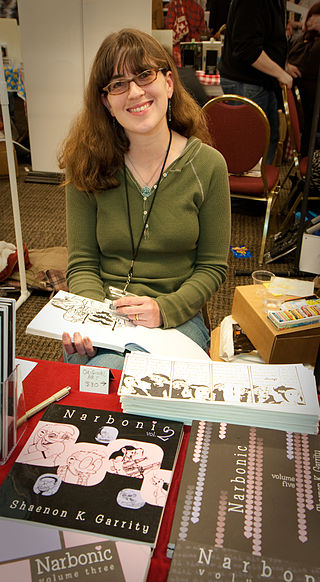
Shaenon K. Garrity is an American webcomic creator and science-fiction author best known for her webcomics Narbonic and Skin Horse. She collaborated with various artists to write webcomics for the Modern Tales-family of webcomic subscription services in the early 2000s, and write columns for various comics journals. Since 2003, Garrity has done freelance editing for Viz Media on various manga translations.

Diesel Sweeties is known as a webcomic and former newspaper comic strip written by Richard Stevens III. The comic began in 2000, originally hosted at robotstories.com. From January 2007 until August 2008 it was syndicated to over 20 United States newspapers, including major daily newspapers like The Detroit News and Houston Chronicle.
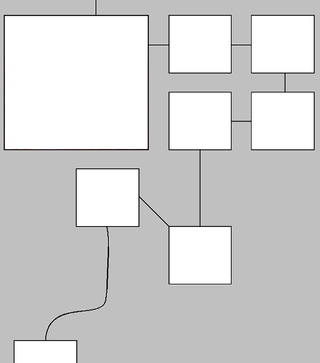
The infinite canvas is the feeling of available space for a webcomic on the World Wide Web relative to paper. The term was introduced by Scott McCloud in his 2000 book Reinventing Comics, which supposes a web page can grow as large as needed. This infinite canvas gives infinite storytelling features and creators more freedom in how they present their artwork.

Dana Claire Simpson, is an American cartoonist, best known as the creator of the comic Phoebe and her Unicorn, as well as the long-running webcomic Ozy and Millie. Other works created by Simpson include the political commentary cartoon I Drew This and the alternate reality drama comic Raine Dog.
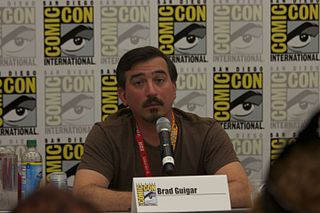
Brad Guigar is an American cartoonist who is best known for his daily webcomic Greystone Inn and its sequel Evil Inc.

Dave Kellett is the creator and cartoonist of two webcomic titles, Sheldon and Drive, the co-author of How To Make Webcomics and the co-host of Comic Lab. He has been nominated for the prestigious Eisner Awards, as well as a Harvey Award, and won a Reuben Award.

In contrast with mainstream American comics, webcomics are primarily written and drawn by women and gender variant people. Because of the self-published nature of webcomics, the internet has become a successful platform for social commentary, as well as lesbian, gay, bisexual, and transgender (LGBT) expression.
Notable events of 2014 in webcomics.
Webcomics have grown in popularity in India since the early 2000s. Early webcomics created by Indian people were written and illustrated by people abroad and focused primarily on the differences in culture the creators experienced. Later webcomics put a strong emphasis on social and political issues present in the country, usually from a liberal perspective. Webcomics can reach large audiences in India when shared through social media.
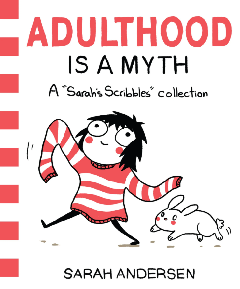
Sarah's Scribbles is a webcomic by Sarah Andersen started in 2011. Andersen initially published the webcomic on Tumblr, but has since released it on various services, such as Facebook, Instagram, Tapas and her own website. Sarah's Scribbles follows Andersen's experiences as a millennial and focuses on themes such as adulthood and maturity. The comic receives millions of views on the Tapas platform and has won multiple Goodreads Choice Awards and a Ringo Award. Andersen has published four print collections of the webcomic: Adulthood is a Myth; Big Mushy Happy Lump; Herding Cats; and Oddball.
Royal Existentials is an Indian webcomic written by Aarthi Parthasarathy and further produced by Chaitanya Krishnan. Using Mughal miniature paintings with overlaid dialogue, Royal Existentials comments upon contemporary politics, social issues, and philosophy.
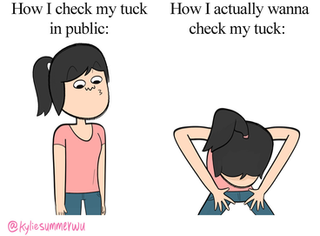
Trans Girl Next Door is an autobiographical webcomic by Kylie Summer Wu, documenting her transition as a transgender woman. Wu started her webcomic shortly after starting her transition in 2013 in order to express and process her feelings. Trans Girl Next Door covers Wu's transition, her love life, and the more mundane parts of her life. Wu was listed in the Trans 100 in 2015 for her webcomic.
Brown Paperbag is a slice of life webcomic by Mumbaikar cartoonist Sailesh Gopalan that began in June 2016.
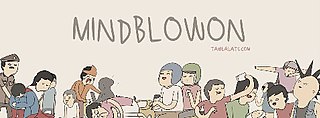
Tahilalats, also known as Mindblowon, is an Indonesian-language webcomic which is created, written and illustrated by Nurfadli Mursyid. First published through the Instagram account @tahilalats in 2014, the daily four-panel comic is one of the most-followed webcomics in Indonesia, being published primarily via WEBTOON and social media platforms such as Instagram and Facebook. The webcomic follows the slice of life genre, generally with the addition of overexaggerated, absurd twists.
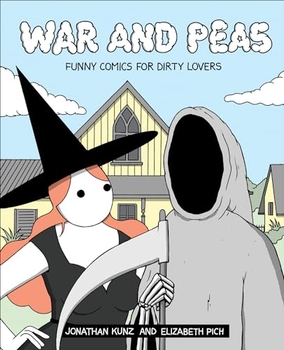
War and Peas is a webcomic by Elizabeth Pich and Jonathan Kunz.
Deena Mohamed is an Egyptian graphic designer, graphic novelist, and illustrator, who was born and raised in Egypt. She made her debut at the age of 18 with her webcomic Qahera, combining both Islamic and feminist values. Mohamed has collaborated with various advocacy groups, such as Harassmap and Centre for Applied Human Rights, to create informational comics.













